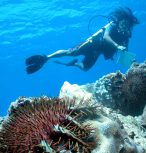DNA reveals the past and future of coral reefs
New DNA techniques are being used to understand how coral reacted to the end of the last ice age in order to better predict how they will cope with current changes to the climate. James Cook Univer

From 2005 to 2022, the main node of the ARC Centre of Excellence for Coral Reef Studies was headquartered at James Cook University in Townsville, Queensland (Australia)








Abstract: Population outbreaks of the coral-eating crown-of-thorns starfish (CoTS), Acanthaster spp., often result in extensive coral mortality with highly extended recovery times, thereby contributing significantly to sustained and ongoing declines in coral cover across the Indo-Pacific. Longterm or permanent solutions depend on filling crucial gaps in our knowledge of the biology of CoTS, particularly its reproductive biology and early life history, to understand the initiation and spread of outbreaks. Populations of CoTS are typically predisposed to major fluctuations due to inherent properties of their life history such as high fecundity, high fertilization rates, and short generation times. However, densities of Acanthaster spp. vary enormously in space and time, pointing to major fluctuations in reproductive success. The overarching question therefore is: what limits recruitment success in CoTS? Small environmental perturbations that trigger life-stage-specific responses can have pronounced effects on recruitment success and hence, on the dynamics of adult populations of CoTS. My research explored the role of environmental factors on (1) gametogenesis and reproductive timing; (2) spawning induction and synchronicity; (3) fertilization and embryonic development; and on (4) larval vitality, in relation to maternal provisioning and larval nutrition. Environmental factors influenced variability in reproductive behaviour and output, life-stage-specific responses, and larval survival, growth, and development. Taken together, these results demonstrate that variable sensitivity of early life history stages and processes to environmental factors can have flow-on effects that disproportionately impact recruitment success and population replenishment in CoTS.
Biography: Ciemon completed his BSc in Biology at Silliman University in the Philippines. He proceeded to work with the Coastal Conservation and Education Foundation after his undergraduate studies and was involved in several coral reef management projects throughout the Philippines. He decided to pursue his MSc in Biology degree at the University of Guam, USA in 2006, where he studied the role of chemical cues on the feeding ecology and distribution of crown-of-thorns starfish (CoTS) populations around Guam. After finishing his MSc, he continued to study and monitor chronic CoTS outbreaks on Guam’s reefs and collaborated with JCU on developing novel techniques to control CoTS populations. He is currently pursuing his PhD under the supervision of Prof. Morgan Pratchett, Dr. Andrew Hoey, Dr. Jairo Rivera-Posada, and Dr. Alexander Kerr. His PhD research explores the influence of environmental factors on the reproductive biology and early life history of CoTS.
New DNA techniques are being used to understand how coral reacted to the end of the last ice age in order to better predict how they will cope with current changes to the climate. James Cook Univer
A new study on the effects of climate change in five tropical countries has found fisheries are in more trouble than agriculture, and poor people are in the most danger. Distinguished Profess
James Cook University researchers have found brightly coloured fish are becoming increasingly rare as coral declines, with the phenomenon likely to get worse in the future. Christopher Hemingson, a
Researchers working with stakeholders in the Great Barrier Reef region have come up with ideas on how groups responsible for looking after the reef can operate more effectively when the next bleaching
Abstract: As marine species adapt to climate change, their heat tolerance will likely be under strong selection. Individual variation in heat tolerance and its heritability underpin the potential fo
Abstract: The Reef Ecology Lab in KAUST’s Red Sea Research Center explores many aspects of movement ecology of marine organisms, ranging from adult migrations to intergenerational larval dispersal
Abstract: Macroalgal meadows are a prominent, yet often maligned component of the tropical seascape. Our work at Ningaloo reef in WA demonstrate that canopy forming macroalgae provide habitat for ad
Abstract: Sharks are generally perceived as strong and fearsome animals. With fossils dating back at least 420 million years, sharks are not only majestic top predators but they also outlived dinosa
Abstract: Connectivity plays a vital role in many ecosystems through its effects on fundamental ecological and evolutionary processes. Its consequences for populations and metapopulations have been
Abstract: Evolution of many eukaryotic organisms is affected by interactions with microbes. Microbial symbioses can ultimately reflect host’s diet, habitat range, and even body shape. However, how
Abstract: The past few years have seen unprecedented coral bleaching and mortality on the Great Barrier Reef (GBR) but the consequences of this on biodiversity are not yet known. This talk will expl